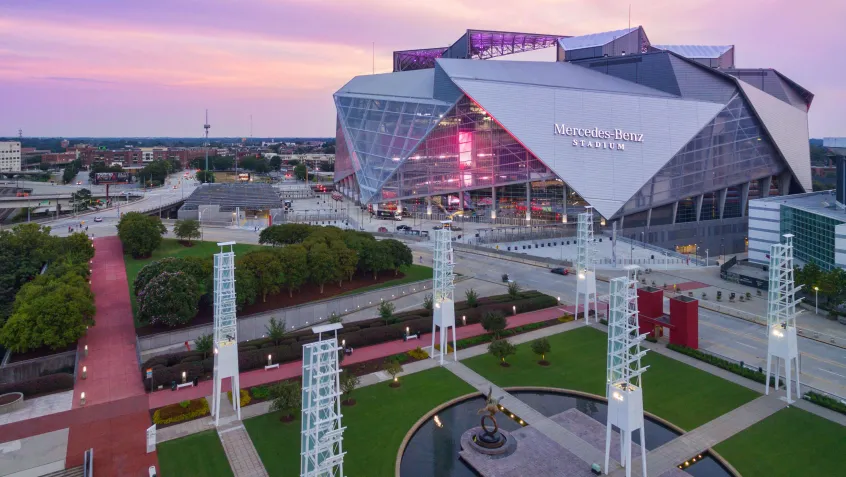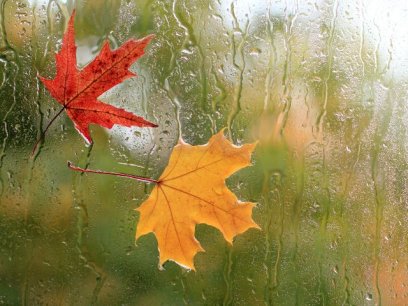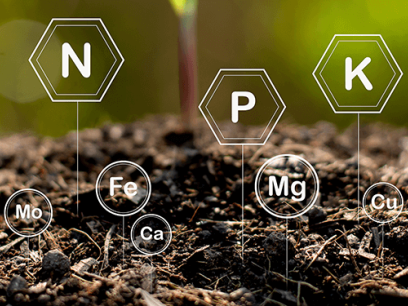
Are you ready for the perfect game day viewing experience this weekend? Los Angeles and New England will face off in Super Bowl 53 at Mercedes-Benz Stadium in Atlanta on Sunday, and if you want to experience the game the way the players do, you might need more than that lucky jersey. Opened just two years ago, Mercedes-Benz Stadium was the first pro sports stadium in the world to achieve LEED Platinum certification, the highest rating tier given by the US Green Building Council. Among the innovative features included in this stadium are 82,500 square feet of LED lighting, 4,000 solar panels, and a system that can collect and store more than 2 million gallons of stormwater on site. While attaching that many solar panels to your house might not be feasible before Sunday, there are other things you can do to make your home or yard more energy and water efficient.
Lighting
Looking for that authentic ambiance for your viewing party? You can recreate the professional stadium experience by making a few changes in your lighting. Although you may not need quite as many bulbs as Mercedes-Benz Stadium uses, you can still save big by switching from incandescent lights to ENERGY-STAR qualified LED bulbs. ENERGY STAR qualified LEDs use 70-90% less energy and last 35-50 times longer than their traditional counterparts, or two to five times longer than fluorescent lighting. Longer lasting lights mean you're less likely to have to run out during the game to replace a burned-out bulb, and the higher efficiency can translate to savings on your electric bill. Score!
Stormwater
When rain (or snow, or sleet, or any other form of precipitation) falls on an impervious surface, impenetrable to water, the precipitation must flow across the ground surface until it reaches a drain, sewer, stream, or other outlet—thus becoming stormwater. When this happens on a large scale, it can lead to devastating flooding as well as increased pollution as it sweeps up trash, debris, and other contaminants in its wake, spelling trouble for local communities and wildlife. To mitigate this impact, the Mercedes-Benz Stadium complex was designed to be able to collect up to 2 million gallons of stormwater onsite, where it is then used for both on-site cooling towers as well as for irrigation for the city's urban forest through a partnership with the local nonprofit Trees Atlanta. While your home may not be able to support the irrigation needs of a major city, there are still small steps you can take to help reduce the impact of stormwater in your neighborhood. Check out a list of suggestions, from permeable pavement to a rain garden, here and make your home feel like your own mini-stadium with water conservation.
Whoever you're rooting for this Sunday, everyone can win by making small changes to save energy, water, and money!
Sources:
- ENERGY STAR. 2016. “Light Bulbs for Consumers.” US EPA and US Department of Energy. Accessed January 28, 2019. https://www.energystar.gov/products/lighting_fans/light_bulbs
- Fennessy, Steve. 2017. "It's official: No other sports facility in the world is as eco-friendly as Mercedes-Benz Stadium." Atlanta Magazine. Accessed January 28, 2019. https://www.atlantamagazine.com/news-culture-articles/official-no-sports-facility-world-eco-friendly-mercedes-benz-stadium/
- Mercedes-Benz Stadium. 2019. "Mercedes-Benz Stadium: The Heart of Atlanta." Accessed January 28. https://mercedesbenzstadium.com/the-stadium/
- Mercedes-Benz Stadium. 2017. "Mercedes-Benz Stadium Becomes First Professional Sports Stadium to Receive LEED Platinum Certification." Accessed January 28, 2019. https://mercedesbenzstadium.com/mercedes-benz-stadium-becomes-first-professional-sports-stadium-receive-leed-platinum-certification/
- Mercedes-Benz Stadium. 2019. "Sustainability." Accessed January 28. https://mercedesbenzstadium.com/sustainability/
- US Green Building Council. 2019. "LEED." Accessed January 28. https://new.usgbc.org/leed
- US Green Building Council. 2017. "LEED BD+C: New Construction v3 - LEED 2009. Mercedes-Benz Stadium LEED Scorecard." Accessed January 28, 2019. https://www.usgbc.org/projects/mercedesbenz-stadium?view=overview


